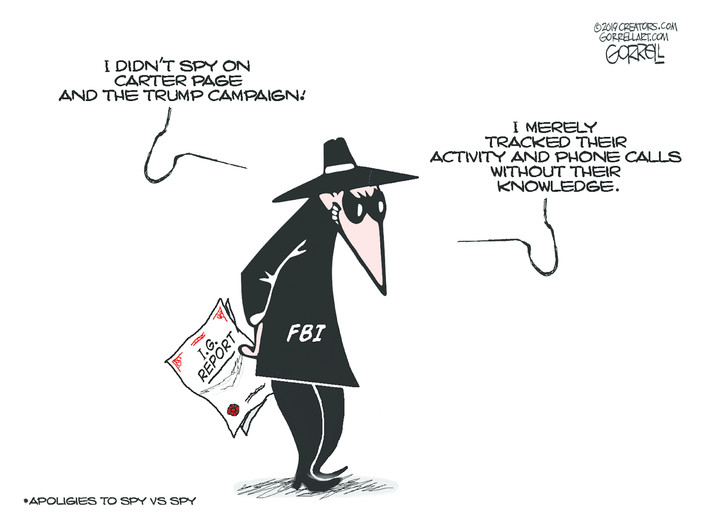
Some Democrats, predictably, are claiming vindication. Some Republicans, just as predictably, are challenging its findings. Neither side is completely wrong — or right, for that matter — but the Democrats might want to show a bit more humility.
The report is devastating about the FBI's court-ordered surveillance of a Trump campaign aide in what was known as "Crossfire Hurricane," the investigation into whether Trump and his campaign colluded with Russia's interference in the 2016 election.
In the words of Hina Shamsi, the director of the ACLU's national security project: "When the Justice Department's inspector general finds significant concerns regarding flawed surveillance applications concerning the president's campaign advisers, it is clear that this regime lacks basic safeguards and is in need of serious reform."
In particular, Inspector General Michael Horowitz's report concludes that the bureau's application for a warrant to electronically spy on a former Trump campaign aide, Carter Page, was riddled with errors of fact and omitted exculpatory information. The application relied on political opposition research from a former British spy, Christopher Steele, whose credibility was exaggerated in the surveillance warrant application to a secret court.
On its own, the fate of Page is not important. It matters because his surveillance gives the public a window into how the process for obtaining electronic surveillance warrants from a secret court can be easily gamed. Because surveillance of a suspected foreign agent or terrorist must be kept from the target, these court proceedings rely on FBI and Justice Department lawyers for the exculpatory information that a defense attorney would provide in an open court proceeding. In the case of Page, that process failed.
The report says, for example, that FBI agents did not share with attorneys reviewing the warrant that Page had actually been cooperating with another U.S. intelligence agency on Russia, even after one of those attorneys specifically asked for such information. It also says the first warrant request failed to include that Page told a confidential FBI informant that he had never met former Trump campaign manager Paul Manafort, contradicting Steele's claim that Page was acting as a conduit between the Kremlin and Manafort for dirt on Hillary Clinton.
All told, the report cites 17 serious errors of fact and omissions in the Page surveillance warrant. "These errors and omissions resulted from case agents providing wrong or incomplete information," it says. The omitted information meant that "much of that information was inconsistent with, or undercut, the assertions contained" in the surveillance warrant applications.
And while investigators did not find documentary or testimonial evidence of "intentional misconduct" on the part of the bureau's case agents, the report says they did not receive "satisfactory explanations for the errors or problems we identified."
All of this counts as an abuse of the FISA process. Not too long ago this was something that concerned Democrats, who led the charge to create the Foreign Intelligence Surveillance Act after horrendous surveillance abuse was uncovered in the 1970s. That legislation created a role for the courts to oversee the surveillance state's electronic eavesdropping.
Now Democrats act as a firewall for that surveillance state. Some of this is because Trump has used his perch at the White House to attack the credibility on the FBI and the intelligence community in general. Echoing the online conspiracy theories of fringe left and right, Trump refers to these institutions as the "deep state." Democrats have sought to defend the legitimacy of these institutions.
But their reaction has also blinded them to real abuses. Consider the January 29, 2018, memo from House Intelligence Committee Democrats defending the FISA warrant of Page. It asserts that the FBI would have been "remiss in their duty to protect the country had they not sought a FISA warrant and repeated renewals to conduct temporary surveillance of Carter Page." This position now looks absurd.
The ranking member of that committee at the time was Representative Adam Schiff. Today he is assembling the impeachment case against Trump. Last year, the broad outlines of the Horowitz report were undoubtedly known to Schiff and his colleagues. In 2018, Schiff could have acknowledged the FBI's errors in the Page warrant and sought the kinds of reforms that Horowitz recommends in 2019.
Instead, Schiff decided to accuse his Republican colleagues of misleading the public about the Page warrant. Psychologists have a term for this: They call it "projection."
Sign up for the daily JWR update. It's free. Just click here.
(COMMENT, BELOW)
Eli Lake is a Bloomberg View columnist who writes about politics and foreign affairs. He was previously the senior national security correspondent for the Daily Beast. Lake also covered national security and intelligence for the Washington Times, the New York Sun and UPI, and was a contributing editor at the New Republic.


 Contact The Editor
Contact The Editor
 Articles By This Author
Articles By This Author